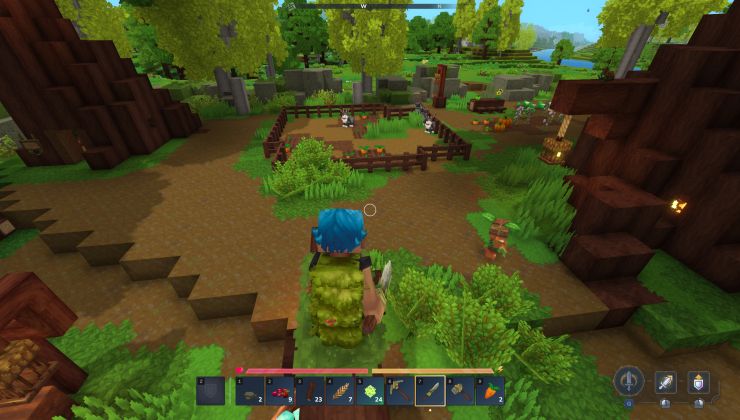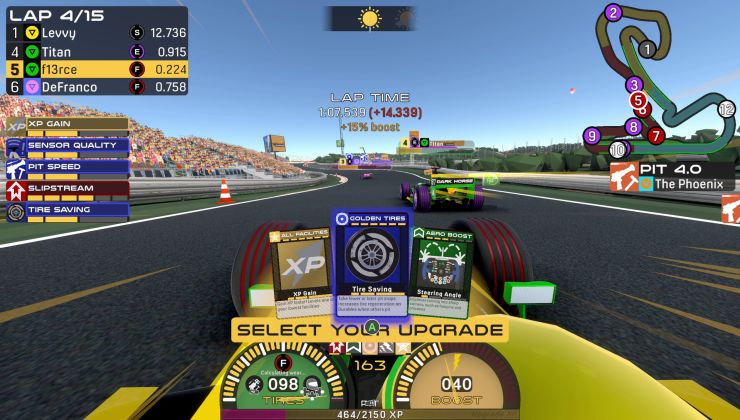In a few previous years (#1, #2), I decided to do a fresh take each time on what the best Linux distribution was for gaming - so I'm back for a 2025 edition of the article that will cause you to tell me how wrong and terrible I am.
What's changed? Well, quite a lot actually. Both previous times I firmly suggested going with plain Ubuntu. However, time moves on, and the software world evolves rather quickly. So I have a new recommendation for you! Why am I even writing this? Sadly, there's still articles out there pushing for tiny completely random fringe distributions and plenty with stupidly outdated and republished information to get to the top of Google.
My current home for a while now, and what I'll recommend you pick up, is Kubuntu. It has all the goodies and support of plain Ubuntu, but with the KDE Plasma desktop environment, which is the same one used on the Steam Deck's Desktop Mode. It has an interface that will be much more familiar to people coming over from Windows, it's more customizable (if you want it) but with a sane default setup that just gets you going quickly.

The latest Long Term Support (LTS) version of Kubuntu, Kubuntu 24.04.1, is supported with security and maintenance updates until April 2027. So you can install it and basically forget about it and keep it running and secure for years to come. However, you're likely better off with Kubuntu 24.10 which is more up to date, if you're okay upgrading again when the next version of Kubuntu comes out (Kubuntu 25.04) which is around April 17, 2025. Either way, both work well.
I've been through Fedora, Manjaro, Linux Mint, plain Ubuntu, Arch and many others over the years. No Linux distributions is perfect and they all come with their own set of quirks and problems, just as Windows has its own set of unique issues. To me, Kubuntu just offers the best all around middle-ground of everything you need to get going.
People will argue about Snaps, but for the majority of normal users — it just doesn't matter in the slightest. I use the Spotify, Thunderbird, Telegram and other Snaps and they work great and are kept nicely up to date without me even needing to do anything.
I will suggest though, that you enable Flatpaks from Flathub, so you get the best of all worlds and access to even more easily installable packages. It's incredibly easy to do as well.
You can download Kubuntu from their website.
If you need help and support for Linux and Steam Deck gaming, you can try asking in our Forum and Discord. Don't forget to follow me on Bluesky and Mastodon too while you're at it.
Don't agree with me? That's fine! The benefit of Linux is that there's truly no one-size-fits-all. Leave a comment to tell me how wrong I am. You're still wrong if you disagree though.
Quoting: Jarmer1TB is not big anymore...Quoting: enigmaxg28 PCI-E Gen 5 drives in a RAID setupexcuse me wtf?
and looking past whatever insanity this statement is, ummmmmmmmmmmmmmmmm yes big speedy storage is dirt cheap and has been for AGES. You can get a 1tb gen4 drive right now for $50-60 if you pick up a sale. That is big, and speedy, and cheap. That's about the cost of a single aaa game these days.
I have a few others things to say as well, getting some stuff off my chest!
Quoting: CyrilLiam, like many people here, you have a monster of a PC, of course you don't care about snaps in performance aspects.Liam does have a good computer (same specs I have) but I built my pc in 2020, which is coming up on 5 years old pretty soon. The specs he and I are running are nowhere near top of the line. Saying he doesn't care about performance on his system isn't fair at all. And it doesn't even really make sense. Of course he cares about performance, we all do.
Quoting: CaldathrasI like Pop!_OS because its semi-rolling nature and also because it is Ubuntu-based.Does anyone have any thoughts on why ubuntu based distros use ubuntu as their base instead of straight debian (which ubuntu itself is based off of) ...? Mint offers a debian based option. I wonder why Pop doesn't? Seems forking a fork would be a development nightmare wouldn't it?
Quoting: JarmerMint offers a debian based option. I wonder why Pop doesn't?The Mint Team has always said they maintain the Debian based option as a backup in case they ever have to drop Ubuntu (for whatever reason). Don't know how System 76 feels ...
Quoting: Jarmer2020 is pretty recent, especially when you built this computer for gaming purpose, it's not an issue at all when speaking about general use... no this is not the question.Quoting: CyrilLiam, like many people here, you have a monster of a PC, of course you don't care about snaps in performance aspects.Liam does have a good computer (same specs I have) but I built my pc in 2020, which is coming up on 5 years old pretty soon. The specs he and I are running are nowhere near top of the line. Saying he doesn't care about performance on his system isn't fair at all. And it doesn't even really make sense. Of course he cares about performance, we all do.
What I meant, if it wasn't clear, it's just that in that context you don't care because the power of your machine will surpass the downside of using snaps anyway.
I wasn't speaking of storage itself, but snaps take more boot time. So in the end it's just slower for general use and it's boring, when it was fine with non-snaps packages.
In that context, I don't see the gain of using them at all.
Quoting: MohandevirBe careful. Because you have a great experience doesn't mean it's the same for everyone.The same is true for any recommendation. See Linus Sebastian for how stable Pop_OS! is! :tongue:
Quoting: ScattershotJoking aside, I recently tried that distribution in a virtual machine, since I had recommended it to others. I couldn't get past the installer because it kept crashing out of X, googled the error message thrown and it's a known issue. :tongue:Quoting: MohandevirBe careful. Because you have a great experience doesn't mean it's the same for everyone.The same is true for any recommendation. See Linus Sebastian for how stable Pop_OS! is! :tongue:
Both are trying to get around the fundamental problem of using a "LTS" distro with up-to-date user applications while they could just move to a "stable" core model and up-to-date end-user applications in their repos for "desktop" installs and keep "server" installs moving more slowly. As an end user, just use a rolling release or more "up-to-date" distro. Personally, I've been running Fedora KDE spin with testing repos and rpmfusion enabled for over 2 years now on both my work PC and personal PC. I've had 1 issue that required a single-user mode boot to undo and a couple of issues because I enable testing, but I file bug reports for those and run that on purpose. Other than that...smooth sailing.
Fedora is the "base" for what will become RHEL, so Red Hat certainly tries to keep it stable while still keeping it up-to-date. The only really big deal with it is that you need to enable the RPMFusion repos, but Steam has its own Fedora RPMFusion repo. It's more or less trivial to enable and then to install Steam.
Last edited by rhavenn on 24 Jan 2025 at 5:05 pm UTC
Last edited by nebadon2025 on 4 Mar 2025 at 4:41 pm UTC
Last edited by sarmad on 4 Mar 2025 at 7:55 pm UTC









 How to setup OpenMW for modern Morrowind on Linux / SteamOS and Steam Deck
How to setup OpenMW for modern Morrowind on Linux / SteamOS and Steam Deck How to install Hollow Knight: Silksong mods on Linux, SteamOS and Steam Deck
How to install Hollow Knight: Silksong mods on Linux, SteamOS and Steam Deck